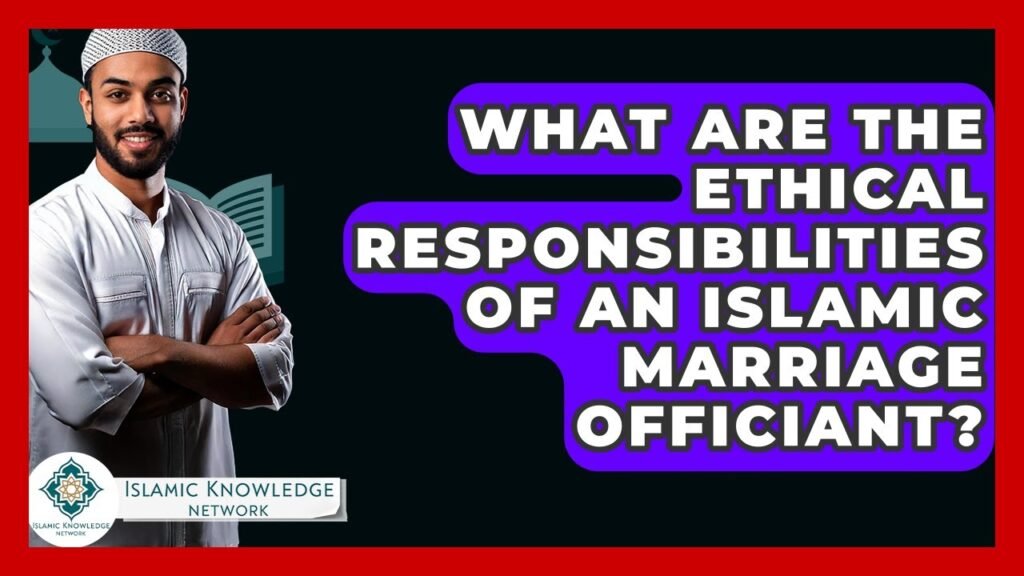You are here to read: What Ethical Responsibilities Does an Islamic Marriage Officiant Have? – A Thoughtfully Written Guide Offering Spiritual Wisdom and Travel Advice for Every Pilgrim who is going on holy journey of Hajj or Umrah.
In today’s fast-paced world, the role of an Islamic marriage officiant transcends mere ceremonial duties; it embodies a profound ethical responsibility that upholds the sanctity of the marriage contract, or nikah. As representatives of Islamic values, these officiants must ensure that every ceremony aligns with the principles laid out in the Quran and Sunnah. This not only involves fostering a respectful and joyful environment for couples but also guiding them through the obligations and rights inherent in Islamic marriage, which is a sacred covenant.
At Airlink Hajj and Umrah, we understand that like marriage, the pilgrimage to Hajj and Umrah embodies deep spiritual significance. Our blog remains committed to providing comprehensive updates and insights to help you navigate your spiritual journey effectively. As we explore the ethical responsibilities of an Islamic marriage officiant, we are reminded of the essential role they play in shaping not just relationships, but the community at large. Join us as we delve into these responsibilities, ensuring that love and faith intertwine seamlessly in every union.
What Ethical Responsibilities Does an Islamic Marriage Officiant Have?
An Islamic marriage officiant plays a pivotal role in uniting couples within the framework of Islamic law. Their ethical responsibilities are multifaceted, beginning with ensuring that the marriage is conducted in accordance with Sharia principles. It is vital for the officiant to verify that both parties give their consent freely and without any coercion, aligning with the foundational Islamic belief in the importance of mutual willingness.
Moreover, the officiant must ensure that all necessary documentation is in order. This includes verifying identities, familial backgrounds, and any prerequisites as outlined by local or Islamic law. Transparency in the marriage contract (Nikah) is crucial, and the officiant must elucidate the rights and obligations of both spouses, facilitating a clear understanding of their commitments.
Additionally, a marriage officiant has the ethical duty to promote harmony and understanding within the relationship. By offering pre-marital counseling, they can guide couples through expectations and responsibilities, fostering a solid foundation for their future. As a resource for the community, the officiant should uphold a standard of integrity and compassion, ensuring that the sanctity of marriage is honored.
For those planning Hajj or Umrah, our blog provides the latest updates and insights, enriching your spiritual journey while emphasizing the importance of ethical practices in all aspects of life, including marriage.
You're at the middle of this awesome post at AirlinkHajjandUmrah.com through: What Ethical Responsibilities Does an Islamic Marriage Officiant Have?. Keep reading, it gets better!
FAQ on What Ethical Responsibilities Does an Islamic Marriage Officiant Have?
FAQs: What Ethical Responsibilities Does an Islamic Marriage Officiant Have?
1. What is the primary ethical responsibility of an Islamic marriage officiant?
The primary ethical responsibility of an Islamic marriage officiant is to ensure that the marriage is conducted in accordance with Islamic principles, ensuring that both parties willingly consent and understand the significance of the union.
2. How does an officiant ensure both parties are entering the marriage voluntarily?
An officiant should engage in pre-marital counseling sessions, facilitating open discussions about the couple’s readiness and willingness to marry, ensuring both parties are free from coercion.
3. What steps does an officiant take to maintain confidentiality during the officiating process?
An officiant has a duty to respect the privacy of the couple, safeguarding any personal information shared during meetings and keeping details of the marriage solemn and confidential.
4. How does an Islamic marriage officiant handle disputes or concerns raised by either party?
An officiant must act with neutrality and compassion, addressing any concerns or disputes with active listening, mediation, and providing guidance while adhering to Islamic principles.
5. What is the officiant’s role in educating the couple about marital rights and responsibilities?
The officiant should inform the couple about their rights and responsibilities in an Islamic marriage, including issues related to finances, family roles, and mutual respect, ensuring they have a clear understanding of their obligations.
That wraps up What Ethical Responsibilities Does an Islamic Marriage Officiant Have?. Thanks for sticking with us till here! Share this: What Ethical Responsibilities Does an Islamic Marriage Officiant Have? with your friends.
Check our homepage at Air Link Hajj & Umrah for more awesome updates.
Some interesting posts are: 1: Umrah Mubarak, 2: When is Umrah closed 2026?, 3: When does Umrah start after Hajj 2026?
Mushu, an experienced Saudi Arabia traveler and writer, shares insightful tips and spiritual reflections to enhance Hajj and Umrah journeys for fellow pilgrims. He has been to Makkah and Madina from 2016 to 2023 many times and his posts will reflect this.







